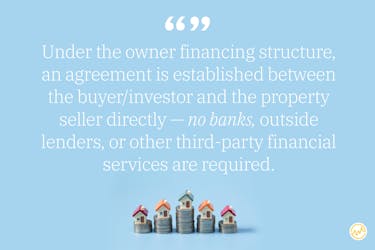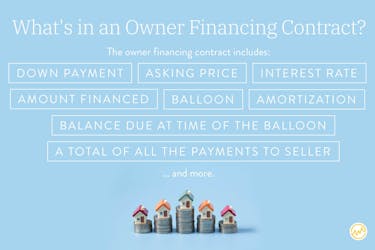



Real estate investing can be difficult for beginners. For buyers who are looking for investment or rental income properties, negotiations can be mind-numbing, taking time and involving multiple third parties — not to mention all of the additional approval processes and closing expenses they can entail.
There is a different option that doesn’t require a bank loan: owner financing.
In this article, we will break down the intricacies of owner financing to help you decide if it's the right method for your situation, whether you are a buyer or seller.
Real estate investors often finance their purchases of income-generating properties through traditional mortgage loans.
These arrangements involve third-party financial institutions who issue the loans. They also tend to require a drawn-out approval process and lengthy amortization periods.
Owner financing is an alternative arrangement.
 party financial services are required." width="375" height="250" />
party financial services are required." width="375" height="250" />
Under the owner financing structure, an agreement is established between the buyer/investor and the property seller directly — no banks, outside lenders, or other third-party financial services are required.
Under owner financing terms, the seller agrees to accept installment payments for the sale of their property until the investor has paid the balance off in full.
Instead of giving the investor money (as in a traditional mortgage), the seller issues a line of credit.
An owner financing agreement will tend to have more flexibility than a traditional purchase agreement.
Repayment periods can be as short as five years or as long as 30 — or any period in between.
Where it’s legal to do so, many sellers choose to negotiate balloon payments for lump-sum cash infusions near the end of the loan, getting their money more quickly, which can also help investors to receive faster returns on their investment.
Keep in mind that seller financing works best when the seller owns the property; a mortgage on a property creates extra complications.
Investors may seek to acquire owner financed homes if they’re looking for quick fix-and-flip opportunities and more affordable terms and interest rates.
For sellers, owner financing is an easier way to earn immediate passive income and gain faster (and potentially larger) payments that go straight into their pockets.
Owner financing may be a good option for sellers whose properties don't qualify for bank financing because of a low credit score.
Owner financing is also a possibility for sellers who want to lower capital gains taxes by stretching tax payments out over many years, rather than having them all due in a single fiscal year.
With owner financing:
An owner financing agreement can provide both buyers and sellers with advantages over traditional loan agreements, such as:
Although they’re methods for acquiring investment properties, there may be some drawbacks to owner financed homes, such as:

One of the best benefits of an owner financing agreement is the freedom for buyers and sellers to negotiate terms between themselves.
Parties in owner financed home agreements have several options for setting up the agreement, which include:
A mortgage owner financing agreement occurs when the owner provides a mortgage to the buyer for the partial or full purchase price of the property. We’ll look at each one next.
In the case of a full purchase price agreement, the owner of the property provides a mortgage to the buyer.
In the case of a partial purchase price agreement, the owner of a property provides a portion of the purchase price of the property. This is used in the event that a buyer could not get funding for an entire mortgage.
A viable alternative to the traditional mortgage type of owner financing, an installment contract is an agreement between a property owner and a buyer where the buyer agrees with the seller to pay in installment for the price of a property, including the interest over a specified time frame.
In the case of an installment contract, the property title remains with the seller until the buyer has completely paid the property's purchase price, including the accrued interest.
A deed of trust is used when a buyer collects a loan from another party to pay for a property. A trust deed, as it is also called, represents an agreement between the two parties involved.
The property is held in trust by an independent and neutral third party until the borrower (the buyer) has fully repaid the loan to the lender (original home owner).
Not all sellers are amenable to owner financing agreements, but investors have a few ways to find those who are, which include:
Once you’ve found the right owner-financed homes, you’ll want to explore the terms of an agreement.
Inexperienced sellers who may have just searched for, “How to sell a house by owner” may not be as familiar with the process, so it can be helpful to know upfront what terms you want to pursue.
The parties agree that the buyer will lease the investment home and retain the option to purchase it outright for an agreed-upon price.
At the end of the term, the buyer can either complete their purchase (with some or all of their regular lease payments to be used toward the final price) or opt to forfeit their lease.
An owner financing contract works similar to bank financing, but the primary difference between both financing structures is that in the case of owner financing, the buyer repays the seller — not the bank.

The owner financing contract specifies:
Keep in mind that the owner financing contract can also be referred to as “seller carryback”, since the property owner holds or carries back the financing.
Let’s look at an owner financing example.
A seller lists a property that is worth $200,000.
You can make an offer at a full price and request for an owner financing contract with about 15% down, which is $30,000.
A seller with no mortgage on a particular property can decide to accept your offer. The seller would then require you (buyer) to pay about $1,247 monthly while he (seller) makes a return of 8%, which can amount to $224,532 in 10 years.
Here are some of the most commonly asked questions associated with owner financing.
In seller financing, the owner of the property retains or holds the title. After the loan is paid, the seller signs a deed that transfers ownership of the title to the buyer.
Although it may not be required by your state to use a title company or title insurance, a title company and/or title insurance can protect you from costly issues relating to past ownership.
Because of this, it is highly recommended. To learn more about title insurance, click here.
In most cases, owner financing does not go on your credit because the property owner is not providing a monthly mortgage payment report to credit reporting agencies.
However, keep in mind that there may be some exceptions if the property owner is a business entity that fulfills the credit reporting requirements from the credit bureau.
Your credit score can be damaged if you default on your payment and the property owner hires the services of a debt collection agency. The agency will report your debt to the national credit reporting agency.
A house with a mortgage can be sold using seller financing but only if it does not violate the terms of agreement with the current mortgage.
For example, mortgages with a due-on-sale clause may cause the original lender to demand outright payment of the remaining loan if the mortgage lender finds out about the owner financing contract.
In the situation of a mortgage, both the buyer and the seller need to know the terms of the agreement.
The Internal Revenue Service has specific rules guiding owner financing contracts, including:
While a well-crafted owner financing agreement can be tailored into a win-win situation for both sides, owner financing is not without risk.
If you decide that owner financing is right for your situation, whether that’s buying or selling a property, the best way to reduce that risk is to increase your education about owner financing through additional real estate investing resources and training.

Founder of House-to-Home Properties
Shawn is a very successful Ohio real estate investor and contractor, with a focus on larger scale renovations, commercial apartment buildings and rental portfolio management. Shawn is the founder of House to Home Properties, LLC as well as Rust Belt Rentals, LLC — Ohio's leading property management and real estate investment company. Shawn spent 10 years serving our nation in the United States Marine Corps. Shawn attributes his success in business and life to dedication, education and coaching.
Learn why a proof of funds letter is important for home buyers and home sellers. Also, learn how a proof of a funds letter differs from a pre approval letter.

Discover the secret to raising capital for multifamily real estate: it's not just about the deal—it's about telling a compelling story that resonates with investors.

Chris Plyler shares how skills from his mulching business enhance multifamily real estate investing. Learn practical tips for financial management, strategic planning, property management, negotiation, and work-life balance.

Discover how Jason Mauney turned personal adversity into multifamily investing success, driven by resilience, strategic partnerships, and a quest for passive income.

Timothy Welting, a former helicopter pilot turned real estate investor, shares his secret to success: checklists. Discover how his structured approach—from goal-setting to market analysis and beyond—ensures profitable investments and confident decision-making in multifamily real estate.

Unlock major tax benefits like depreciation, interest deductions, cost segregation, 1031 exchanges, and a 20% QBI deduction through the game-change that is multifamily investing.